This article has been updated to reflect that SB25 failed to pass and that a new act is being championed, the Second Chance Parole Reform Act. The original article can be found here.
The Broken State of Parole in Georgia
Georgia’s prison system is failing, and the blame lies squarely with a parole board that perpetuates injustice through bias, lack of transparency, and arbitrary decisions. By denying parole to eligible inmates without clear reasoning or actionable feedback, the board has created a culture of hopelessness that fuels violence, exacerbates overcrowding, and leaves Georgia’s prisons in a state of crisis. Rather than providing a pathway to rehabilitation and reintegration, the current system has become a driver of chaos and catastrophic deaths across the Georgia Department of Corrections.
A Board Built on Bias
The Georgia State Board of Pardons and Paroles is composed entirely of individuals with law enforcement and prosecutorial backgrounds. This includes former district attorneys, sheriffs, and state troopers, none of whom bring perspectives from rehabilitation, mental health, or social work. With their careers rooted in punishment and prosecution, the board’s inherent bias against releasing inmates casts doubt on its ability to fairly consider parole cases.
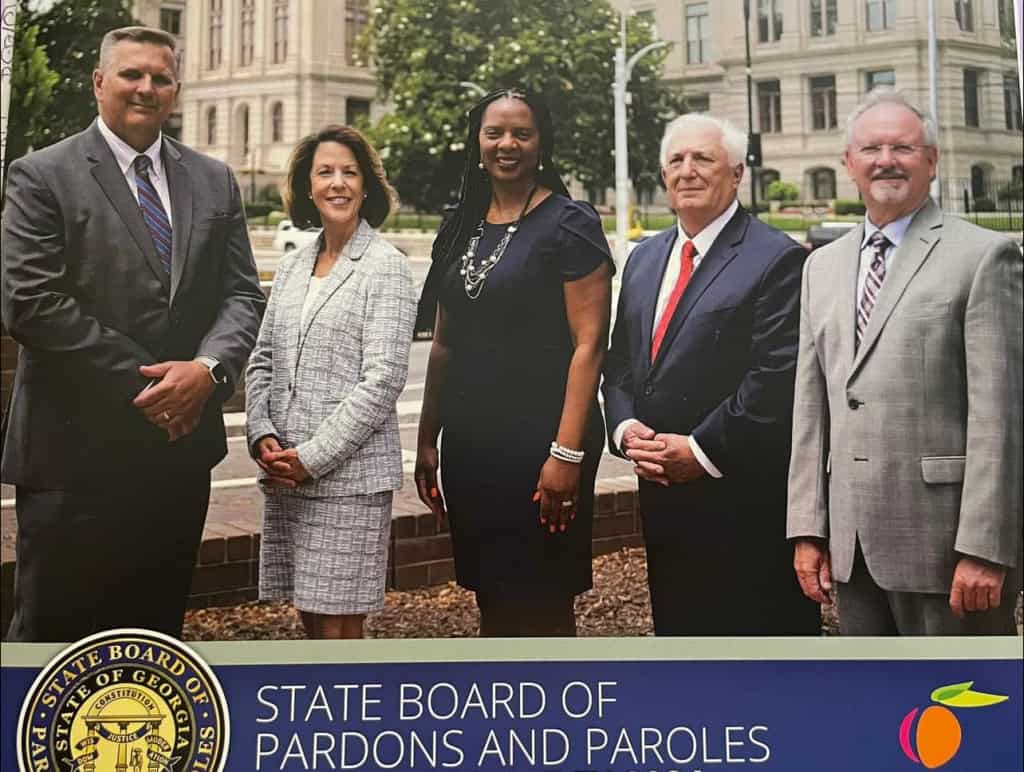
The Problem with Arbitrary Denials
For many inmates eligible for parole, the process feels like a cruel guessing game. They frequently receive form letters stating that their parole has been denied because they “haven’t served enough time for the crime.” These letters provide no detailed reasoning, no actionable steps for improvement, and no guidance on what is expected of the inmate to secure release. This blanket approach robs inmates of hope and accountability while leaving families confused and disheartened.
The Consequences of a Broken System
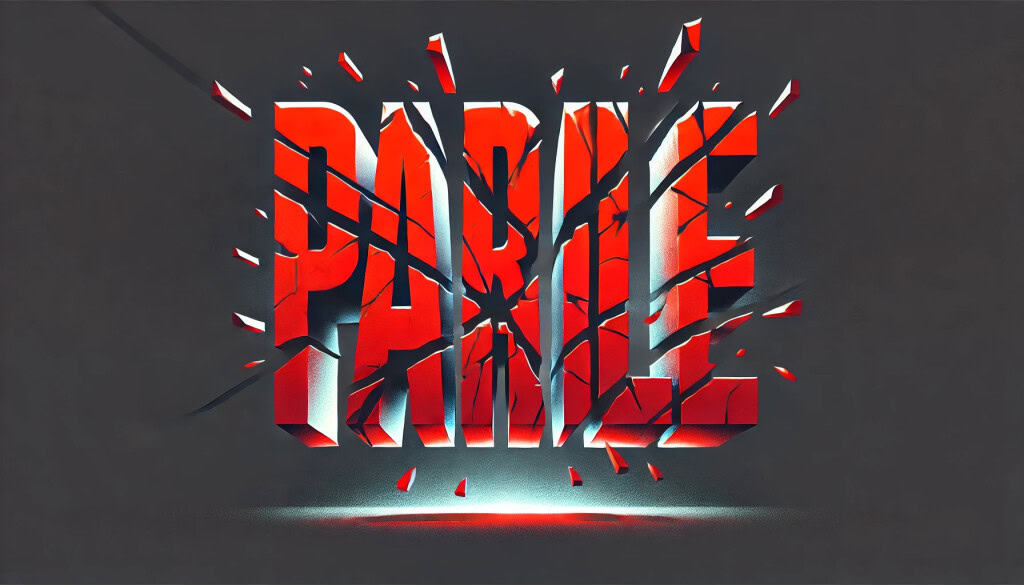
This lack of transparency and fairness has far-reaching consequences. Georgia’s prisons are overcrowded and understaffed, creating dangerous conditions for both inmates and correctional officers. Parole-eligible inmates languish behind bars, contributing to the violence and tension within the system. Meanwhile, families on the outside are left grappling with emotional and financial burdens as they wait years for decisions that often feel arbitrary and unjust.
The current parole system not only fails inmates and their families but also wastes taxpayer dollars and erodes public trust. Without meaningful reforms, Georgia’s prisons will continue to be places of despair rather than rehabilitation, perpetuating a cycle of incarceration with no clear path forward.
The Case for Reform
Fixing Georgia’s broken parole system requires bold action and a commitment to fairness, transparency, and rehabilitation. While small steps have been taken in the past, the time has come for meaningful reform to address the systemic issues that have left the system in disarray.
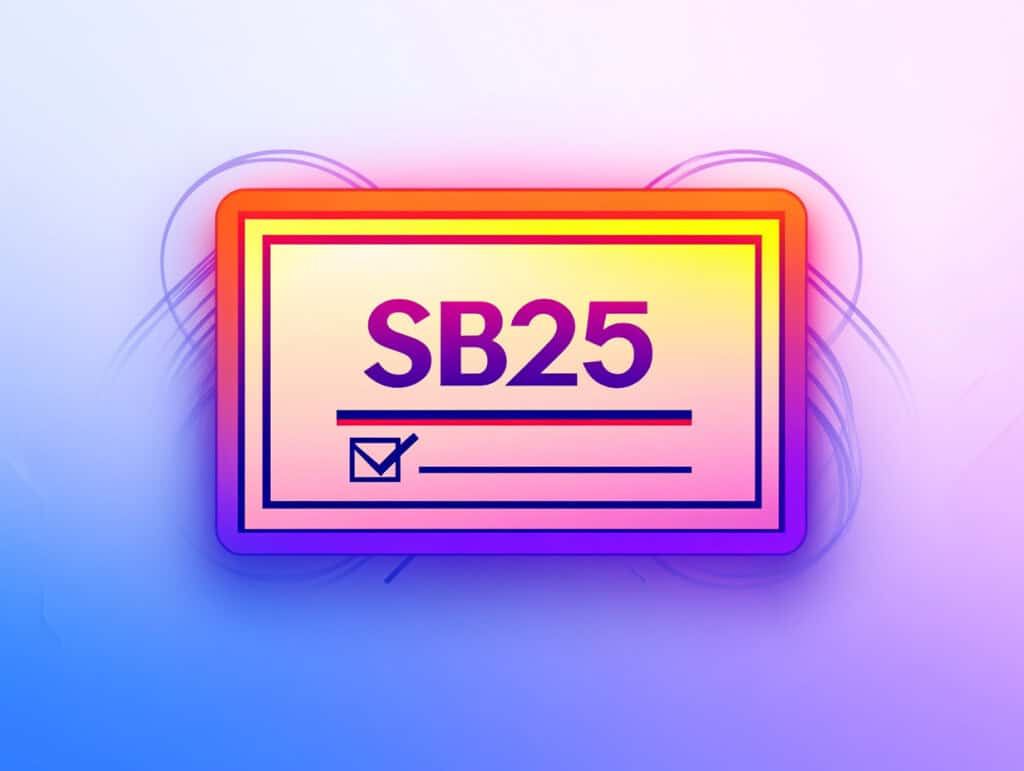
SB25: A Missed Opportunity
Senate Bill 25 aimed to bring much-needed transparency and accountability to Georgia’s parole system. The bill proposed mandatory video conferences, written findings for parole denials, and majority review requirements. Unfortunately, SB25 failed to make it out of committee in the 2025 legislative session, receiving support only from Democratic lawmakers. While the bill represented a critical first step toward transparency, it ultimately did not go far enough to address the full scope of the crisis—and now, it’s been replaced by a more comprehensive proposal.
Broader Reforms Needed
1. Expand Parole Eligibility and Expedite Decisions
- Why it Matters: Thousands of parole-eligible inmates remain in prison despite meeting eligibility criteria. Expanding parole eligibility for offenders and expediting reviews would ease overcrowding and reduce costs.
- How to Implement:
- Broaden eligibility for parole, especially for individuals with good behavior records.
- Require regular reviews of long-overlooked cases to ensure no one is lost in the system.
2. Tie Parole to Rehabilitation
- Why it Matters: Linking parole eligibility to rehabilitation incentivizes positive behavior and helps inmates prepare for life after release.
- How to Implement:
- Offer parole in exchange for completing programs like addiction treatment, job training, and counseling.
- Partner with nonprofits to expand program access, particularly in overcrowded prisons where resources are limited.
3. Set Clear Expectations for Inmates
- Why it Matters: Many inmates remain in the dark about what they need to do to achieve parole, leading to frustration and hopelessness.
- How to Implement:
- Establish a system where parole is tentatively set for the 50% mark of an inmate’s sentence, with opportunities to reduce time through good behavior and program completion.
- Penalize violent disciplinary infractions by delaying parole eligibility.
A Better Path Forward: The Second Chance Parole Reform Act
The Second Chance Parole Reform Act goes beyond SB25, addressing its shortcomings and introducing new, enforceable standards for fairness and rehabilitation. This new proposal includes presumptive parole eligibility, required hearings and written explanations, shorter reconsideration intervals, independent oversight, and expedited medical and geriatric parole reviews. It represents a more complete vision for justice—one that restores hope, prioritizes public safety, and holds the system accountable.
To read more about the Second Chance Parole Reform Act, visit: https://gps.press/second-chance-act
The Human Impact of Reform

These changes aren’t just policy—they’re about restoring hope and dignity to inmates and their families. Providing inmates with clear expectations and opportunities for rehabilitation creates a path toward reintegration into society. For families, transparency and fairness offer a chance to advocate for their loved ones and plan for a future where they can reunite.
But the impact of these reforms would also ripple through the prison system itself, fostering a safer and more controlled environment. Currently, many inmates view the parole system as a rigged game—one where their behavior or efforts to improve seem to have little bearing on the board’s decisions. This creates a toxic culture of hopelessness. When inmates feel that parole is unattainable or arbitrary, they have little motivation to follow rules or engage in rehabilitative programs.
In contrast, a system that sets clear expectations and rewards good behavior offers inmates something they desperately need: hope. With a tangible path to parole—one that values participation in education, work programs, or therapy—prisoners gain a reason to comply with rules and invest in self-improvement. This hope can be a powerful motivator, reducing misconduct and, by extension, the violence that currently plagues Georgia prisons.
This is especially true for the small percentage of inmates who drive the majority of violence within prisons. These individuals often feel they have nothing to lose, contributing to an atmosphere of fear and instability for other inmates and staff. By creating incentives for positive behavior and tangible consequences for violent actions, reforms can reshape this culture, making prisons safer for everyone.
Reforms like those proposed in the Second Chance Parole Reform Act, would also empower prison staff. When inmates have clear incentives to behave and pathways to better their situation, staff face fewer challenges maintaining order. Overburdened officers would no longer need to manage an environment fueled by hopelessness and rebellion, reducing stress and burnout in a system already stretched thin.
Ultimately, a safer prison environment benefits everyone—from inmates to officers to the broader community. When prisons focus on rehabilitation and offer clear pathways to reintegration, they transform from chaotic holding cells into places where real change is possible. The Second Chance Parole Reform Act lays the foundation for this transformation, and it is what Georgia’s parole system must become.
A Transparent and Fair System
A truly effective parole system must provide inmates with clear expectations, a pathway to rehabilitation, and a timeline they can work toward. Georgia’s current parole process fails to offer these assurances, leaving inmates without hope, guidance, or accountability. A reimagined system would establish firm parole dates that align with rehabilitation milestones, incentivize positive behavior, and ensure public safety.
Georgia has an opportunity to redefine its parole system by balancing public safety with fairness and rehabilitation. A model like the Second Chance Parole Reform Act not only transforms prisons into places of growth but also ensures that parole becomes a meaningful step toward reintegration and community safety.
Advocating for a Better Parole System

Georgia’s parole system is in desperate need of reform. While Senate Bill 25 represented an early effort to introduce transparency and accountability, it failed to make it out of committee and has since been replaced by a more comprehensive solution: the Second Chance Parole Reform Act. This new proposal builds on the lessons of SB25 and addresses its limitations with a bold, enforceable roadmap for fairness, oversight, and rehabilitation.
A truly fair and transparent system must provide inmates with clear expectations, prioritize measurable progress, and restore public trust. The Second Chance Parole Reform Act does exactly that—by mandating written reasons for denials, requiring hearings, limiting deferral periods, and establishing independent oversight. It’s not just a legislative update—it’s a paradigm shift. These reforms aim to create a system rooted in accountability, fairness, and hope—principles that benefit not only inmates and their families but also the public at large.
Reforming the parole system isn’t just about policy; it’s about people. It’s about giving incarcerated individuals a real opportunity to rehabilitate, reintegrate, and rebuild their lives. It’s about easing the emotional and financial burdens on families left waiting for justice. And it’s about ensuring our prisons serve their purpose as places of growth, not despair.
But change won’t happen without advocacy and collective action. Here’s how you can make a difference:
A Call to Action
Advocating for changes to the parole system starts with raising public awareness and putting pressure on decision-makers. Here’s how you can help:
1. Contact Your Representatives
- Reach out to your state senators and representatives to demand meaningful reforms to Georgia’s parole system.
- Use Impact Justice AI (https://ImpactJustice.AI): This powerful tool helps you craft effective, evidence-based messages to lawmakers, media outlets, and decision-makers. Simply input your goals, select the recipients, and let the system generate well-written, impactful communications tailored to your cause.
2. Mobilize Your Network
- Ask your friends, family, and fellow advocates to join the movement. The more voices legislators hear, the harder it is for them to ignore public demand for justice. Share social media posts, petitions, and articles to raise awareness.
3. Contact Media Outlets
- Write to local and state media to highlight the importance of parole reform and share stories about the need for change. Media coverage amplifies these issues and puts additional pressure on the parole board and lawmakers.
4. Write USPS Letters
- Handwritten or typed letters sent via mail to legislators and media outlets carry significant weight. They show a level of commitment that stands out in today’s digital age.
By following these steps, you can be part of the movement to bring fairness and transparency to Georgia’s parole system. Impact Justice AI simplifies advocacy by providing evidence-based messages, making it easier than ever to amplify your voice. Whether you’re emailing legislators, contacting the media, or sharing personal stories, every action contributes to the fight for a fairer system.
Together, we can push for meaningful reform. We can make Georgia’s parole system fairer, more transparent, and focused on rehabilitation, while making Georgia’s prison safer. And we can ensure that justice and hope are no longer distant dreams but achievable realities.
Let’s act now—because the future of justice in Georgia depends on what we do today.
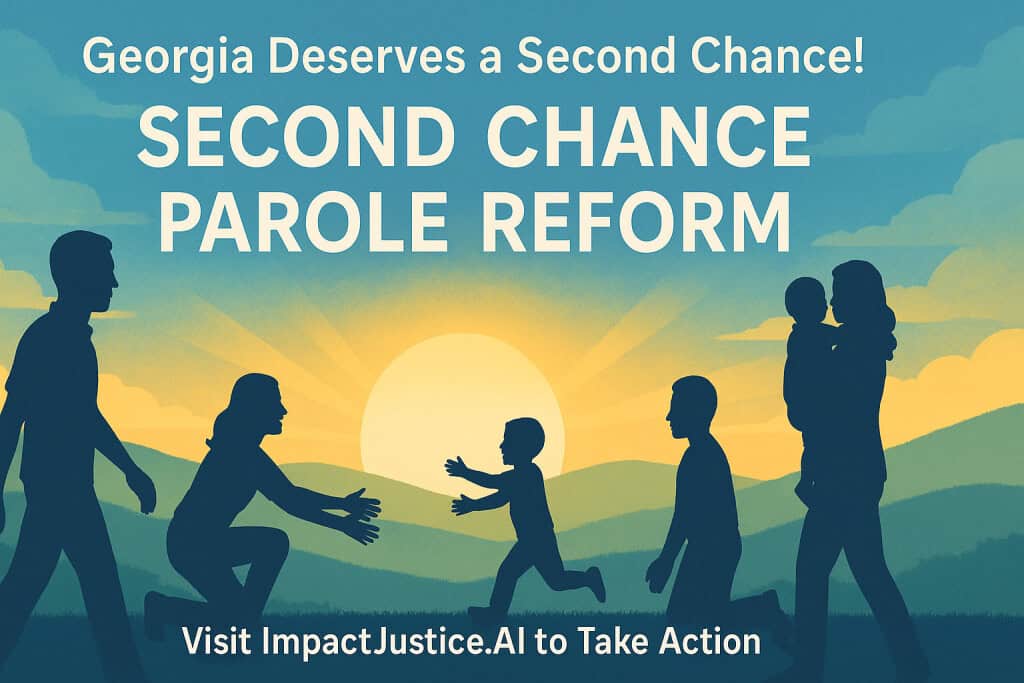

🔗 Additional Reading
- A Second Chance for Georgia: Fixing Parole With the Reform It Desperately Needs
- Buried Alive: Innocent and Sentenced to Life in Prison
A heartbreaking look at how parole delays and judicial indifference leave innocent people to die behind bars. - Guilty Until Proven Innocent: You WILL be Found Guilty
Investigates the front-end of Georgia’s justice system—and why so many end up trapped in parole limbo. - In and Out: The Lives Destroyed by the GDC
Explores the revolving door of incarceration and how the absence of rehabilitation contributes to recidivism. - From Kangaroo Courts to Chaos: Georgia’s Prison Crisis
Details how arbitrary disciplinary actions and misclassification sabotage rehabilitation and parole readiness. - How Georgia Prisons Habitually Cover Up Murders
Highlights the extreme consequences of hopelessness inside—a key factor in arguing for timely parole. - A Simple Message for the GDC
Offers bold, clear solutions—including parole reform—as a means of fixing Georgia’s prison system.
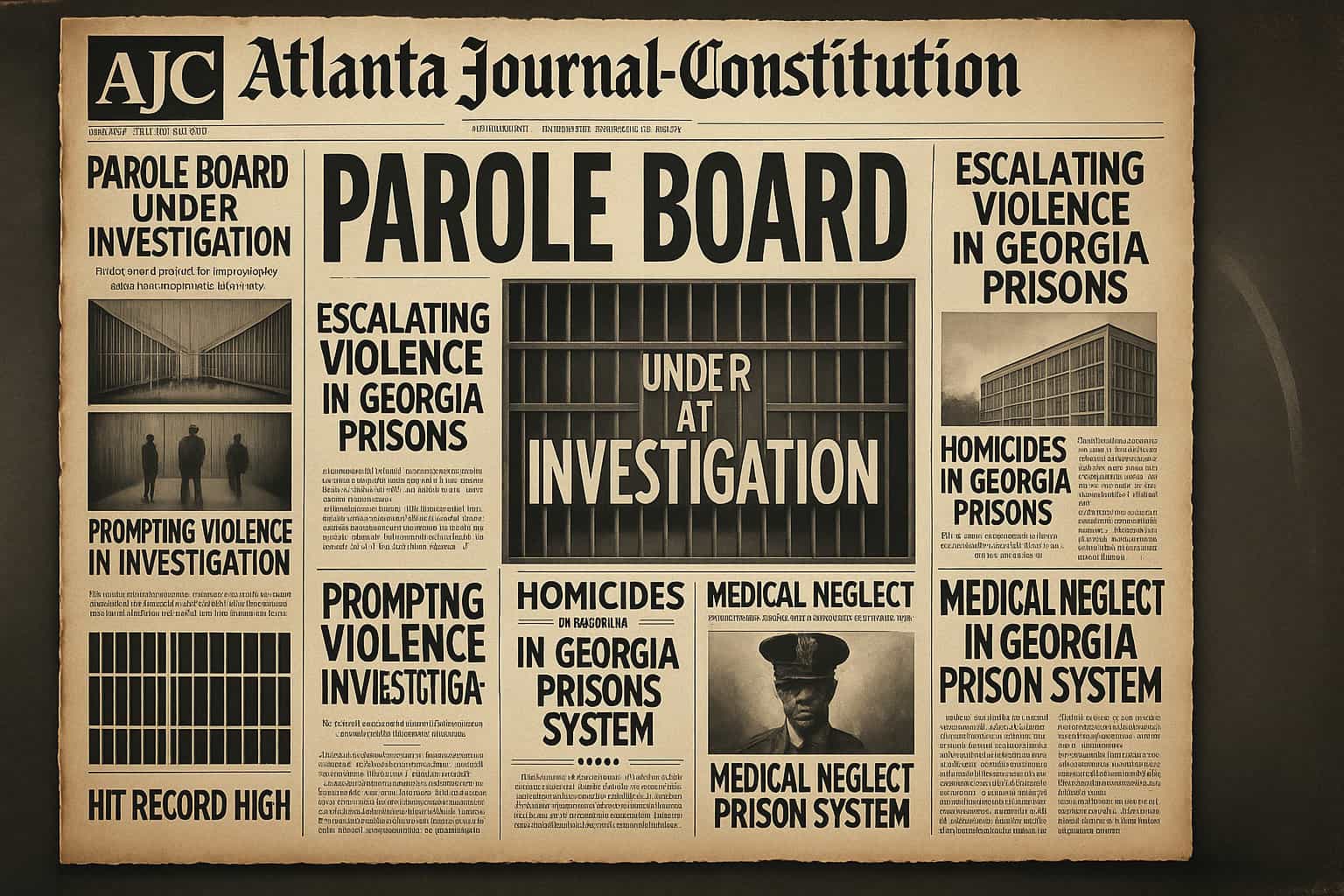
I have proof of a Parole officer, in Toombs County Ga, siding with a long time abuser, drug user, and Parent to a man on Parole, to be this Man’s voice. The Parolee is the abused in this case. NO Justice has been brought forth, only a Parole officer giving ultimate power to the abuser to speak for the abused, and to use the GA PAROLE SYSTEM to further his abuse on his son, also the parolee. How can you cry out for help, if your voice is silenced…
We’re so sorry to hear this — what you’re describing is deeply troubling and, unfortunately, not uncommon in Georgia’s parole system. When parole officers misuse their authority or take sides in abusive situations, it becomes another form of coercion and control. No one should ever feel silenced, especially when they’re trying to rebuild their life.
While Georgia Prisoners’ Speak can’t intervene directly, we strongly encourage you to document everything — dates, names, communications, and any evidence you have showing bias or abuse of authority. You can report misconduct by a parole officer to the State Board of Pardons and Paroles Office of Professional Standards at (404) 657-9450 or through their online contact form at https://pap.georgia.gov.
You can also bring public attention to this kind of abuse by using ImpactJustice.AI — our advocacy tool that helps families and citizens send verified emails to legislators, oversight agencies, and media outlets. The more people speak up, the harder it becomes for officials to ignore the corruption and retaliation embedded in the system.
Please know you’re not alone — what you’ve witnessed matters. Every voice that refuses to stay silent helps build the pressure for oversight, fairness, and accountability in Georgia’s parole system.
— Georgia Prisoners’ Speak
https://GPS.press